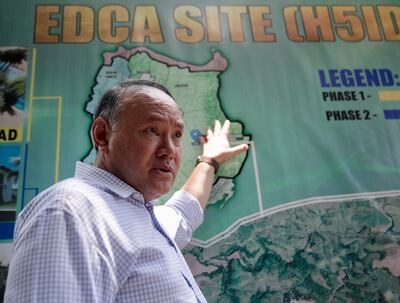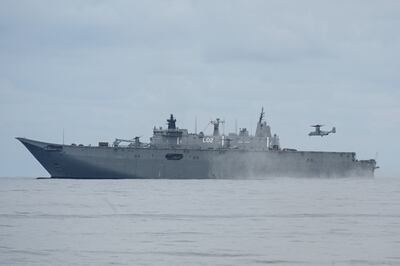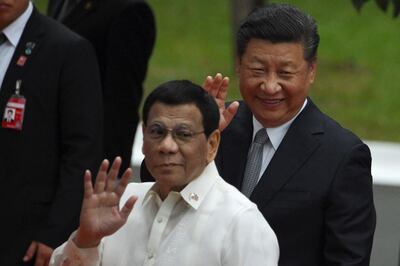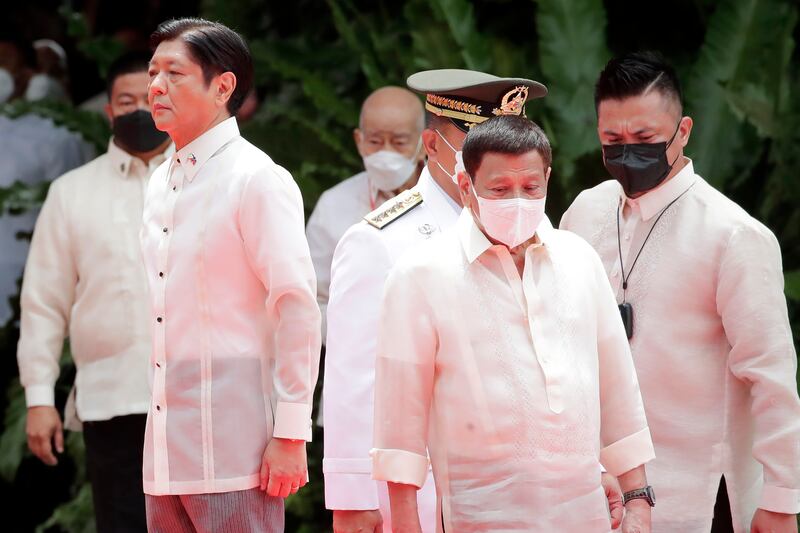With all politics being local, parochial interests often shape even the grandest policies of contemporary leaders.
Foreign policy, for instance, can’t be understood without taking domestic politics into consideration. This is especially the case in modern democracies, where pressure groups and powerful lobbies can shape, if not dictate, the foreign policy direction of even the most powerful presidents.
In today’s Philippines, however, something bizarre is taking place. For the first time in recent memory, foreign policy issues are beginning to define domestic politics.
President Ferdinand Marcos Jr is facing stiffest opposition not from his liberal-progressive critics, who have been politically marginalised in recent years, but from within the ruling coalition.
Former president Rodrigo Duterte, father of current Vice President Sara Duterte, has criticised his successor’s foreign policy direction. In particular, he has accused the Marcos Jr administration of risking direct conflict with China by rapidly expanding defence co-operation with the US.
Last month, Mr Duterte made a controversial visit to Beijing, where top Chinese leaders publicly asked him to help ease bilateral tensions. The visit was apparently not co-ordinated with Philippine officials, underscoring the former president’s willingness to challenge his successor’s authority on foreign policy matters.
Although Mr Marcos Jr tried to assuage Mr Duterte’s concerns during a subsequent meeting, the incumbent is clearly committed to a radically divergent foreign policy from his Beijing-friendly predecessor. The upshot is a potential showdown between the two powerful leaders, most likely during the midterms elections in 2025, which could determine Mr Marcos Jr’s legacy years in office.
For more than half-a-decade, two powerful dynasties have dominated Philippine politics, namely the House of Duterte, representing the country’s “Deep South”, and the House of Marcos, representing the “Solid North”. In last year’s elections, the “UniTeam” tandem of Mr Marcos Jr and Sara Duterte won the greatest share of votes in contemporary Philippine history.
The liberal-progressive opposition has been thoroughly vanquished in the past three elections, leaving the Marcos-Duterte axis in an unprecedented position of dominance in Philippine politics. Last year, only a single opposition candidate won a spot in the 24-member Senate, the Philippines’ upper chamber. In the lower house, there are barely a dozen opposition members while the administration’s allies are in the hundreds.


Opposition leaders such as former vice president Leni Robredo have largely retreated into social programme advocacies, while many others have become travel bloggers and TikTokers. Fed up with decades of dysfunctional politics, the Filipino electorate has largely embraced the populist agenda of the Marcos-Duterte axis.
Yet the incumbent is grappling with cracks in his own alliance only a year into his presidency.
Factionalism within the governing coalition exploded into the surface following the perfunctory demotion of Gloria Macapagal Arroyo in the congressional leadership. The move was reportedly due to suspicions that the former president, currently a congresswoman, was “plotting a coup” against House Speaker Martin Romualdez, who is Mr Marcos Jr’s cousin and his de facto right man.
Shortly after, Sara Duterte resigned from the governing party, led by Mr Romualdez, to express her discontent against “political toxicity” and “execrable political powerplay”. Soon, a word war erupted between the Vice President and the Speaker’s allies.
Aside from powerplays, a major source of friction was Ms Arroyo’s vocal opposition to Mr Marcos Jr’s warming defence ties with the West. Like the Dutertes, Ms Arroyo has generally favoured robust ties with China, with a view to lessen her country’s dependence on traditional allies as well as de-escalate tensions in the disputed South China Sea.
But while Ms Arroyo has shunned publicly criticising Mr Marcos Jr, Mr Duterte has not shied away from openly doing so. Recently, he zeroed in on the Enhanced Defence Co-operation Agreement (EDCA), which grants the Pentagon extensive, flexible and rotational access to a host of prized military facilities across the Philippines. During his term in office, Mr Duterte refused to fully implement this pact.
Perturbed by rising tensions in the South China Sea, however, Mr Marcos Jr has gone so far as expanding the EDCA by, inter alia, granting the US forces access to bases close to both the South China Sea and Taiwan’s southern shores. In response, Mr Duterte has accused his successor of unduly provoking China and undermining Philippine sovereignty due to expanded US presence.
Earlier this year, Mr Duterte even claimed, without providing evidence, that the Pentagon is intent on placing nuclear warheads in EDCA bases, thus risking an apocalyptic conflict at the Philippines’ expense. Then came his visit to Beijing, where he met President Xi Jinping and other Chinese leaders.
Although the details of the meeting are yet to be publicised, it is possible that Beijing sought Mr Duterte’s assistance to dissuade his successor from granting extensive access to American troops under EDCA. Mr Marcos Jr has repeatedly sought to reassure China that Manila will not allow its bases to be used by the US for offensive operations, particularly in an event of conflict over Taiwan. But Beijing remains unconvinced.

In any case, Mr Duterte’s intervention appears to have backfired. Shortly after his meeting with Mr Marcos Jr, Philippine Defence Secretary Gilbert Teodoro declared “it is not any other countries’ business to question what we do here [with our own military bases]”. Mr Teodoro made it clear that EDCA reflects Manila’s sovereign prerogative and is, operationally, meant to enhance the Philippines’ defensive capabilities.
Rising tensions in the South China Sea, particularly over the Philippine-controlled Second Thomas Shoal, has only reinforced the Marcos Jr administration’s pivot to traditional allies. If anything, the incumbent is coming under growing pressure to stand up to China in tandem with allies.
A recent survey by the New York-based Eurasia Group consultancy showed that seven out of 10 Filipinos are distrustful of China. Another authoritative survey, commissioned by the Manila-based Stratbase ADR Institute, showed that more than 80 per cent of the public want the government to seek assistance from allies to protect the Philippines’ position in the South China Sea.
Eager to stay in tune with public opinion, top legislators have also called on the government to take more drastic action, including forming a “new quadrilateral” security alliance with the US, Australia and Japan; taking its maritime disputes to the UN General Assembly; and potentially placing even Philippine-occupied islands in the South China Sea under the EDCA.
A great believer in diplomacy, Mr Marcos Jr will probably shun overly provocative actions in the near future. He has already approved joint patrols with allies in the contested areas and may also seek US assistance during its resupply mission to hotly contested areas such as the Second Thomas Shoal. Otherwise, he may risk both public backlash as well as growing opposition from the Philippine political elite.
However, Mr Marcos Jr’s foreign policy direction has placed him on a collision course with his predecessor, who has warned of potentially leading an opposition if policy differences deepen. The 2025 midterms could, therefore, become a proxy war between the two most powerful political dynasties in the Philippines, particularly over foreign policy issues.





